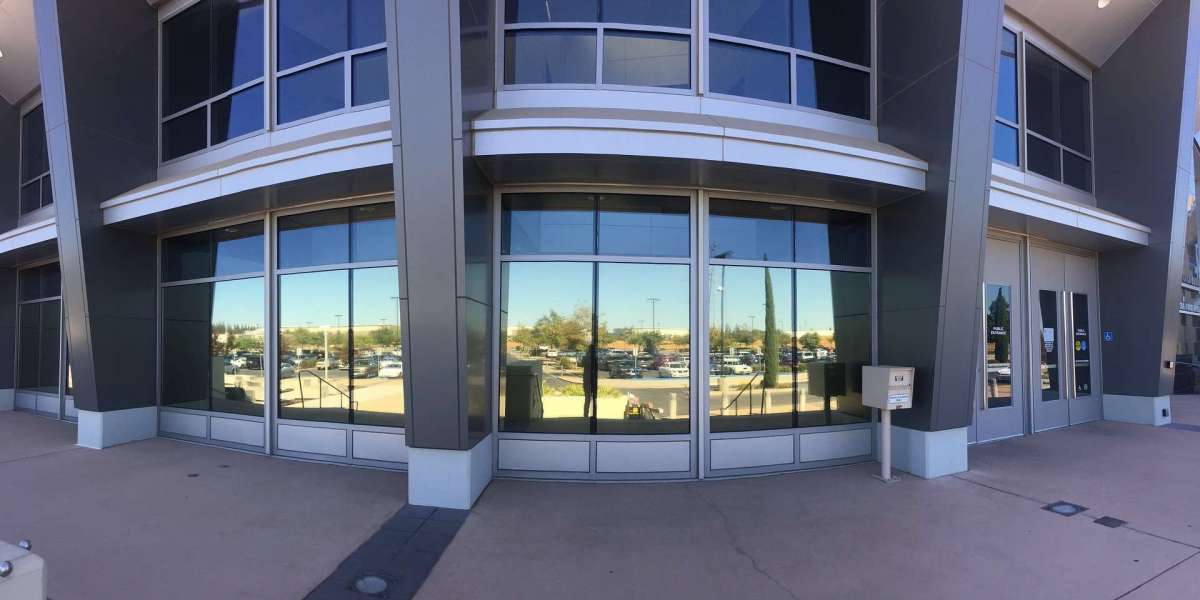Commercial window tinting has become an essential service for modern businesses looking to improve their workplace aesthetics, energy efficiency, and employee comfort. With advancements in window film technology, businesses now have access to a range of solutions that not only enhance appearance but also provide practical benefits.
In this guide, we’ll explore everything you need to know about commercial window tinting, from its benefits to types, installation process, and maintenance.
What is Commercial Window Tinting?
Commercial window tinting involves applying a thin film to the interior or exterior surface of glass windows in commercial properties. These films are designed to reduce glare, block harmful UV rays, and improve energy efficiency. Window tinting can be customized to suit various business needs, from privacy enhancement to aesthetic improvements.
Key Benefits of Commercial Window Tinting
Energy Efficiency
One of the primary reasons businesses invest in window tinting is to save on energy costs. Window films can reduce heat gain during summer and heat loss in winter, allowing HVAC systems to work more efficiently. This translates to lower utility bills and a smaller carbon footprint.
UV Protection
UV rays can damage furniture, flooring, and office equipment over time. Window films block up to 99% of harmful UV rays, protecting interior assets and ensuring the longevity of office décor.
Improved Privacy and Security
Tinted windows enhance privacy by obscuring the view from the outside while maintaining visibility from within. Security films add an extra layer of protection, preventing glass from shattering during break-ins or accidents.
Enhanced Comfort
By reducing glare and managing indoor temperatures, window tinting creates a more comfortable environment for employees and customers. This can boost productivity and overall satisfaction.
Aesthetic Appeal
Tinted windows lend a sleek, professional appearance to any building. With a variety of shades and styles available, businesses can achieve the perfect look that aligns with their brand identity.
Types of Commercial Window Films
Solar Control Films
These films are designed to reduce heat gain, control glare, and block UV rays. They are ideal for buildings with large windows exposed to sunlight.
Decorative Films
Perfect for enhancing the aesthetics of office spaces, decorative films offer a range of patterns and designs. They are often used for branding or creating stylish interiors.
Safety and Security Films
These films reinforce glass strength, making it harder to break. In the event of an impact, they hold shattered pieces together, reducing the risk of injury.
Anti-Graffiti Films
Designed to protect glass surfaces from vandalism, anti-graffiti films are easy to replace, saving businesses the cost of window replacements.
Frosted and Privacy Films
Frosted films are commonly used in conference rooms and offices to enhance privacy without sacrificing natural light.
Industries That Benefit from Commercial Window Tinting
Retail Stores
Window tinting enhances storefronts by reducing glare and preventing UV damage to displayed products. It also creates a comfortable shopping experience for customers.
Office Buildings
From privacy to energy savings, window tinting is a practical solution for office environments. It promotes employee well-being and productivity.
Restaurants and Cafes
Tinting helps regulate indoor temperatures and reduces glare, creating a pleasant dining atmosphere for patrons.
Healthcare Facilities
Hospitals and clinics use tinted windows to enhance patient privacy and maintain a clean, professional appearance.
Educational Institutions
Schools and universities benefit from energy savings and increased safety provided by window films.
The Installation Process
Consultation and Assessment
Professional window tinting begins with a consultation to assess your building’s needs. Experts evaluate factors like window size, orientation, and specific goals for the project.
Film Selection
Based on your requirements, a suitable type of film is selected. You can choose from a variety of options tailored to energy efficiency, privacy, or aesthetics.
Professional Installation
Trained technicians apply the film using specialized tools to ensure a smooth, bubble-free finish. Proper installation is critical to achieving long-lasting results.
Post-Installation Care
After installation, the film may take a few days to fully cure. During this period, it’s important to avoid cleaning the windows.
Maintenance Tips for Commercial Window Tinting
Use Gentle Cleaners
Avoid abrasive cleaning products. Use a soft cloth and mild, ammonia-free cleaner to clean tinted windows.
Avoid Sharp Objects
Prevent scratches by avoiding contact with sharp objects or tools near the window.
Regular Inspections
Inspect tinted windows periodically to ensure they remain in good condition. Promptly address any signs of peeling or bubbling.
Costs of Commercial Window Tinting
The cost of commercial window tinting varies depending on factors such as the size of the windows, type of film, and complexity of installation. On average, businesses can expect to pay $5 to $15 per square foot for professional services. While this may seem like a significant investment, the long-term energy savings and other benefits often outweigh the initial expense.
Choosing the Right Service Provider
When selecting a window tinting service, consider the following:
Experience: Opt for a provider with extensive experience in commercial projects.
Quality of Materials: Ensure they use high-quality films from reputable manufacturers.
Customer Reviews: Look for positive reviews and testimonials from previous clients.
Warranty: A good provider offers a warranty on both the film and installation.
Conclusion
Commercial window tinting is a smart investment for businesses looking to improve efficiency, aesthetics, and comfort. By choosing the right type of window film and working with a trusted service provider, you can transform your workspace while enjoying significant cost savings.
If you’re considering window tinting for your business, don’t hesitate to consult a professional. They can help you identify the best solutions tailored to your unique needs, ensuring a successful and satisfying outcome.








